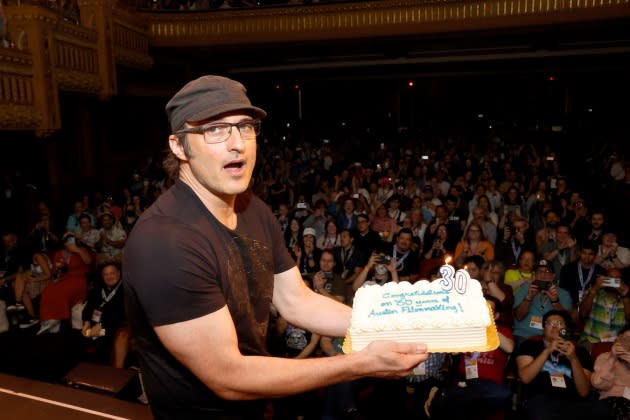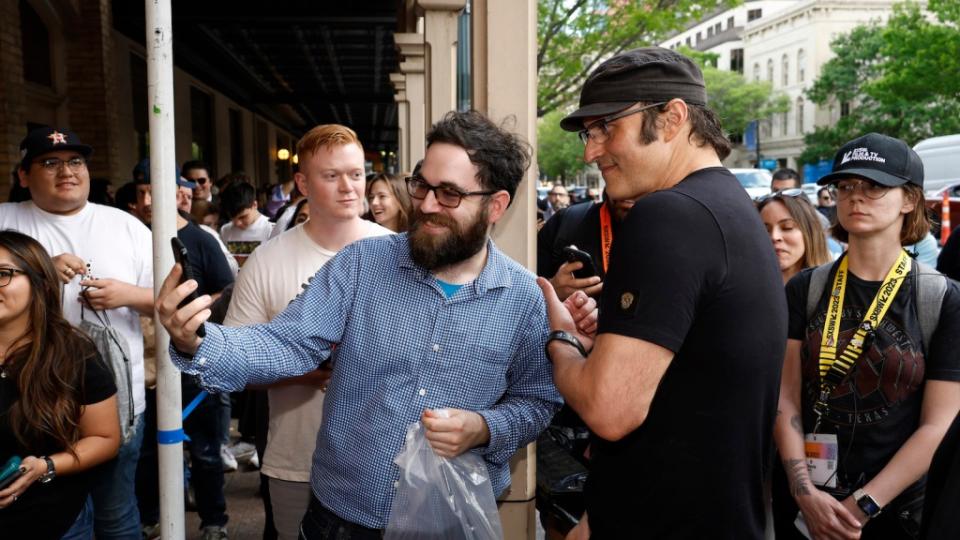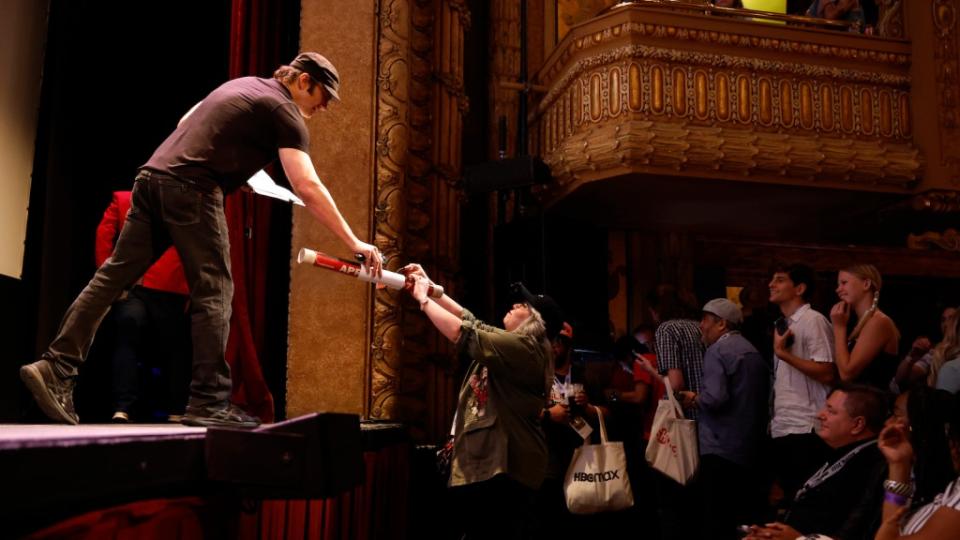How Robert Rodriguez Transformed His SXSW Premiere on Oscars Night Into a Homegrown Celebration of Cinema (EXCLUSIVE)
- Oops!Something went wrong.Please try again later.

Robert Rodriguez didn’t want to screen his new movie for the first time on the same night as the Oscars. It just worked out that way.
It all started when, in mid-February, the 54-year-old filmmaker realized he was rapidly approaching the 30th anniversary of the theatrical release of his first feature film, the neo-Western “El Mariachi.”
More from Variety
Remi Wolf Roars, A Giant Dog Stuns, Ben Kweller Returns and More SXSW Highlights
'Raging Grace' Review: SXSW Winner Is a First-Rate Suspenser with a Sociopolitical Soul
“It fucking snuck up on me,” Rodriguez tells Variety on Sunday afternoon, sitting on a hotel rooftop bar overlooking the ever-changing Austin skyline. Rodriguez famously shot “El Mariachi” on a $7,000 budget, and its success helped to catalyze the independent film revolution of the 1990s and reinforce Rodriguez’s conviction to continue his DIY, homegrown approach to filmmaking. Almost all of Rodriguez’s films have been made at least in part out of his Austin-based Troublemaker Studios, from his R-rated action films like 1998’s “The Faculty,” 2005’s “Sin City” and 2010’s “Machete” to his family movies franchises “Spy Kids” and “Sharkboy and Lavagirl.” Even 2019’s “Alita: Battle Angel,” the James Cameron-produced action epic with visual effects work by Weta Digital, was shot at Troublemaker.
With the Austin-based South by Southwest Film Festival rapidly approaching in March, Rodriguez knew he wanted to commemorate his major career milestone at the event in some meaningful way. But he also didn’t want to repeat what he’d done in 2013, when he screened “El Mariachi” at SXSW’s marquee venue, the Paramount Theater, for the film’s 20th anniversary.
“Then I went, wait a minute, I’ve got an almost finished movie that was conceived, written, developed and shot in Austin,” Rodriguez says.
That movie is “Hypnotic,” a twisty psychological thriller starring Ben Affleck as a police detective who discovers that his missing daughter has something to do with a series of bizarre robberies committed by a mysterious man (played by William Fichtner). SXSW has screened unfinished films before — like 2011’s “Bridesmaids” and 2016’s “Sausage Party” — and Rodriguez thought bringing it to the festival would be “a cool way to say thank you” to the Austin filmmaking community that he’d called home.
So he called up the festival less than a month before it was set to start and asked if there were any open slots left at the Paramount Theater.
“And they go, ‘Well, the slot that nobody wants is the Oscar one,'” he says.
SXSW did not intend to take place the same weekend as the biggest event in the film industry. The festival has always started on the second weekend of March, and after the Academy of Motion Pictures Arts and Sciences announced in May that the 2023 Oscar ceremony would take place on March 12 — i.e., the first Sunday of SXSW — the festival chose not to move.
But that left SXSW with a day that most filmmakers and talent would want to avoid, between the total lack of media oxygen and the fact that they could be attending the Oscars themselves. (Indeed, Eva Longoria premiered her feature directorial debut “Flamin’ Hot” and Elizabeth Olsen premiered her HBO limited series “Love & Death” on Saturday afternoon at SXSW, in time for both women to fly back to Los Angeles to present at the Oscars on Sunday.)
Rodriguez, however, had a different mindset.
“I just want that theater and I want an audience,” he says, a few hours before “Hypnotic” makes its work-in-progress debut at SXSW. “Yeah, if you’re a movie fan, you’re probably watching the Oscars. But if you’re a real movie fan, you’re probably going to want to see a movie. Even if it’s 10 people, they’re going to be people that are really amped up to see it because they’re into it. That’s the best audience to show it to.”
Instead of 10 people, Rodriguez got over 1,000, packed into every last open seat in the Paramount. And instead of the Oscars, Rodriguez didn’t just treat those audience members to a $7 million pulpy sci-fi noir — he spent nearly an hour after the screening sharing stories about his career, memorabilia from his movies and advice about filmmaking. On the same night that the most celebrated figures in the film industry were extolling the magic of the movies, Rodriguez did the same, with people who are at the very beginning of their own career trajectories.

In the car en route to the theater, I ask Rodriguez if he’s planning on following along with what’s happening during the Oscars as “Hypnotic” is playing. He shakes his head, no. He’s excited for the possibility of “Everything Everywhere All at Once” having a good night — “I always love when the independent films make it, because I came out of nowhere,” he says. But anyone who’s attended SXSW knows there’s a rousing alchemy to watching a movie unspool at the Paramount, and Rodriguez wants to be present for it.
“If it was a regular theater, yeah, I probably would be” following the Oscars, he says. “But this theater is just — it’s a very live room.”
For the rest of the evening, the Oscars come up exactly twice. When Rodriguez arrives at the Paramount — roughly the same time that filmmakers like Steven Spielberg and Guillermo del Toro are walking the champagne carpet outside the Dolby Theater — he spends roughly 10 minutes outside the venue taking pictures with the throng of fans who’ve gathered at the door, as well as some of his film’s cast, including Fichtner and Rodriguez mainstay Jeff Fahey. When the crowd begins to flood into the walkway that runs past the theater, a pedestrian trying to get through bellows an amusing, Oscar-y non sequitur: “Out of the way! Lady Gaga is not that popular!”
Just after 6:30 p.m. Central Daylight Time — roughly 30 minutes before the Oscar telecast begins — Rodriguez takes to the stage to introduce the movie and thanks everyone for coming out “on Oscar night.”
Otherwise, the Academy Awards remain an unspoken backdrop to an evening that is in almost every way its inverse — but just as passionate about films and filmmaking, led by Rodriguez’s relaxed but no less infectious enthusiasm. Clad in black jeans, a black t-shirt with an elaborate black skull embossed on the front, and a black pageboy cap, Rodriguez exudes the earnestness of someone still in their twenties.
As the final credits for “Hypnotic” being to play, Rodriguez makes a quick exit backstage to ensure his meticulous plans for the audience Q&A are in place. Over the previous few days, he combed through his archives, pulled posters for all of his movies, and signed and carefully labeled them; he explains to me that he’s going to hand them out to the audience members who first ask about each movie. (As part of Variety’s exclusive access to the screening, I emceed the Q&A with Rodriguez, which effectively meant I stood on stage and called on the next audience member in line waiting to ask a question.)
Rather than just hope the audience gets wise to his intentions, Rodriguez tips the scales in his favor a bit. When he was with fans waiting outside the Paramount before the movie, he found one who said she loved 2005’s “The Adventures of Sharkboy and Lavagirl,” and told her to wave both arms at him when he asked the audience for the first question.
That’s exactly what happens. “Sometimes movies mean something to us for the weirdest reason,” Rodriguez says as he opens the Q&A, pacing across the stage while holding a leather-bound notebook filled with typed notes on what he wants to say. “It’s just there at the right place at the right time. It’s a very personal thing.” He tells the crowd to ask questions about any of his films that might meet that description — “the more obscure the better.”
On cue, the young woman from earlier waves both her arms, and Rodriguez calls on her. She steps to the mic and explains that she was “just so intensely in love” with “Sharkboy and Lavagirl” when she was younger.
“I saw it so many times as a kid,” she says.
“Did you ever see it in 3D?” Rodriguez asks, noting that in 2005, there were barely any digital 3D theaters in the country, so most 3D screenings had to use the old-fashioned red-and-blue glasses instead.
“Yeah. There was a 3D version of it in our local family video and I made my parents get me 3D glasses just to watch it like that,” she says. “Once my brother got to the age where he was like, ‘Hey mom, can we watch “Shark Boy and Lava Girl”?’ She just put her hand on his head and said, ‘No.’”
As the crowd laughs, Rodriguez calls the woman up to the stage and hands her the poster from the movie. And then he points to a man in a red sports coat standing at the lip of the stage.
“Give him your information,” Rodriguez says. “You and your brother are going to come to Troublemaker Studios.” The audience begins to erupt in cheers as Rodriguez struggles to talk over them. “And! And! And! You’re going to see [‘Shark Boy and Lava Girl’] in a 4K screening room and you’re going to bring your parents and make them watch. They’re going to see it in 3D the right way!”

For the next 45 minutes, the Q&A follows that same pattern. A fan mentions their love for one of Rodriguez’s films; Rodriguez talks in detail about about an aspect of making that film, and then the fan receives a signed poster from that film, often with an invitation to visit Troublemaker. But rather than a glorified ego trip, the experience unfolds more like a shaggy seminar on Rodriguez’s approach to filmmaking. Invariably, the person asking a question has some kind of filmmaking ambitions; often, they’re students either still in college or freshly graduated. And Rodriguez is eager to share as much of his experience as he can.
He talks about how making movies within his own community has sustained his creativity, and urges everyone to do the same. He says the biggest barrier is thinking you have to wait to be ready to start creating, but “you’re never ready — you just have to start and then you get ready.” He methodically breaks down how “Hypnotic” was shut down three separate times over the first year of the pandemic, as locations that looked like they would work out kept falling through. Because his budget was finite from pre-sales of foreign distribution rights, the only way he could save money was to whittle down his 55-day shooting schedule to 34 days and transform Troublemaker into most of the locations for the film. (A producer of “Hypnotic” tells me later that they’re finalizing their distribution plans and hope to release the film later this year.)
Finally, a festival official whispers in my ear that we have to be out of the theater in 10 minutes, so I announce that there’s time for only two more questions. Rodriguez asks the crowd if anyone is a fan of his Danny Trejo vehicle “Machete,” and hands shoot up across the entire theater. He calls on one guy sitting near the front, put down his mic and races off stage to get what he promises will be a surprise. Rodriguez’s children, who had been sitting in the audience, would tell him later that people began to speculate out loud that the director was going to bring out Trejo himself.
Well, he does and he doesn’t. Wrapped in a blue terrycloth towel, Rodriguez steps back on stage with what can only be described as a frightfully convincing baby Machete with an adult Danny Trejo head.
“Look at how real it is!” Rodriguez says as the crowd gasps and guffaws in disbelief. “It’s one of my favorite things at the studio.”
Rodriguez saves his best gift, however, for the very end, when a 50-year-old man says that he’d worked on Rodriguez’s 2018 reality series “Rebel Without a Crew” (named after the director’s 1995 filmmaking memoir) and the episode of “The Mandalorian” Rodriguez directed.
“This is my year of ‘I did it,’” the man says. “I’m tired of working for everybody else. So my question is, how do you stay motivated?”
Rather than tell him an answer, Rodriguez decides to show him, inviting the man to visit the set of Rodriguez’s next film.
“You’re going to sit for two days behind the monitor and ask questions,” Rodriguez says. “You may watch me and say, ‘OK, that’s how not to do it.’ But you’ll still learn something!”
The man bursts into a wide grin, and tells Rodriguez he’s a veteran who served for two tours in the Iraq War. “My hashtag is ‘film is my therapy,’ so I appreciate that,” he says.
Even though his time is up, Rodriguez seems like he could stay up there for another hour. He looks down at his notes and offers a concluding thought that could easily have come out of the mouth of someone accepting a golden statue at that same moment in Los Angeles.
“Just be creative,” Rodriguez says. “Try to apply creativity to everything. Your business calls. Your work life. How you raise your kids. Think of yourself as living a creative life. I’m so appreciative of everybody here and the career I’ve had. But I tell you, I don’t feel any different than I did when I was in an apartment making something — making a drawing, making a piece of music, putting some edits together. The art itself is the reward. If you go, ‘I just haven’t gotten anywhere’ — if you’re already doing art, you’ve already made it.”
Someone yells out, “Yes sir!”
Rodriguez pauses, his low burr of a voice growing softer with emotion. “So keep doing it,” he says. “Because we need you to do it and only you can do it.”
About 90 minutes later — after Rodriguez has decamped to a nearby bar in Austin to celebrate with his family and the film’s crew and cast — the Oscars finally conclude in Los Angeles, and I approach Rodriguez to say goodbye.
“I don’t know who the winners are,” he tells me, so I rattle through them. For each one, Rodriguez exclaims in genuine excitement — “Oh, wonderful! Yes! Wow!” Then I ask him how he feels about his own big night in Austin.
“This is how it’s been down here for 30 years, except I never gave away this much stuff,” he says with a laugh. “It’s that reciprocal thing that that makes it so special here.” He slips back into a version of what he’s been saying all night, about how important it is for creative people to find their community and support each other.
“I’m gonna answer your first question,” he says, referring to our conversation six hours earlier. “‘Why did you want to show an incomplete film?’ Because it’s about so much more. It’s about a reason to get us all together and share an experience and exchange stories about what it all means. And everyone gets to witness magic, even me.”
Best of Variety
Sign up for Variety’s Newsletter. For the latest news, follow us on Facebook, Twitter, and Instagram.

